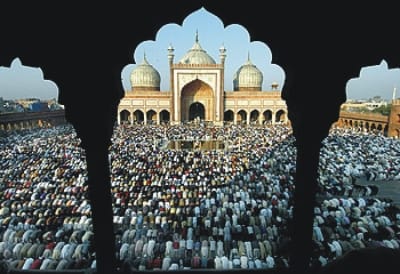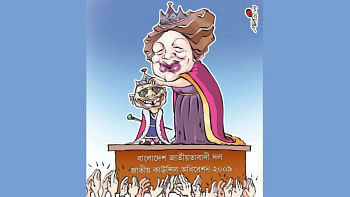Modernity and Islam: In quest of compatibility

Photo: AFP
Relationship between Islam and modernity lies in the interaction between Islam and the West at different levels and in different forms, and is a centuries old phenomenon. Modernity, and its related concepts and ideas, has contradicted Islam since Christian civilisation came to produce and embody modernity in the last three hundred years.
Islam engaged itself in a contention with modernity as Muslim civilisations first rejected it due to its Christian nature during the 18th and 19th centuries. Since then Islam has long been confronting a challenge on the question of modernity. This challenge obviously came from the western scholars, most of whom still argue that Islam hasn't yet fully embraced modernity.
For them, there are some modern phenomena which aren't dealt with in Islam; meaning its (Islam) failure to address issues linked to modernity viz modern state institutions and economy, secularism, and most importantly democracy. In the wake of such concerns that Islam and Muslims are characterised as being incompatible with modernity, this article explores whether Islam is really opposed to modernity in the contemporary world.
It is somehow widely believed in the West that acceptability of Islam can come only through its transition into modernity, which is a complex and multidimensional phenomenon usually defined in universalistic and essentialist terms.
Hence, advocates of the modern schools of thought say that Islam is still in its traditional form, which is incongruent with modern life as well as the modern world. But this argument can be countered if we say that Islam and Muslims mustn't adopt modernity by incorporating all modern beliefs and practices incompatible with Islam.
Considering this fact it wouldn't be irrational to bridge Islam with modernity even if it is set apart from many attributes of the western modernism! And at the same time it requires analysis to see to what extent Islam follows the basic tenets of modernity.
Going back in history, we can see that during the reign of the Ottoman Empire, as soon as Islam came in closer ties with Europe, it was introduced to military technology, European law and the arts. Conversely, Europe was also influenced by Islamic thought.
Despite the intensity of cultural encounters coupled with the consolidation of British hegemony at that period, the colonisation of Islamic societies didn't give way to Islamic fundamentalism directed against western dominance but to Islamic modernism, an ideology of Muslim restructuring.
A clear consequence of the mutual impact of modernisation and Islam can be best illustrated by the emergence of modern Turkey, which was the first to adopt modernism and project a conscious or unconscious blend of Islamic values and practices.
After Turkey, Muslim countries like Iran, Egypt, Jordan, UAE, the Philippines and many others, particularly in the Middle East, absorbed modernity while also allowing radical changes in the political system.
Nevertheless, many Islamic states like Saudi Arab, Syria, UAE, Jordan, and Brunei are still ruled by kings, sheikhs, sultans and dictators. Thus, Islam has always been subjected to modernist schools that do not accept Islam's correlation with modernity largely due to the failure in restoring democracy in most countries of the Muslim world.
The observation that some Islamic countries lack democracy may be fair, but this crisis is by no means on account of Islamic teachings or incompatibility. The root causes lie in a host of factors --historical, political, economic and cultural -- not in Islam.
Although the modern democratic system was born in the west, it wasn't welcomed there in the beginning because, until the 18th century, the Christian Church opposed modernity and democracy, which became acceptable to western societies only during the 19th century.
On the other hand, the monarchy system was subsequently developed by the traditional Ulema (Islamic scholars) who conferred legitimacy on monarchy not in the light of Islamic teachings but only to prevent anarchy. Thus, an authoritarian power structure was established in the Muslim countries where Islam's followers had been selectively shaped to sustain monarchy.
Monarchy was further consolidated as a result of serving the vested interest of the imperialists, firstly of Europe and then that of the US, who have always propped up corrupt and authoritarian rulers, particularly in the Middle Eastern Muslim countries. Hence, a deep urge for democracy and popular government among the people of those countries has always been frustrated by the heavy hand of the authoritarian rulers, who did permit Islam to establish democracy.
Beside the analysis of such factors, the Holy Qur'an may also help us understand Islam's reluctance in supporting any dictatorship or authoritarianism. In fact, the intrinsic message of the Qur'an does not allow Islam to legitimise any rule constituted or acquired through power. Rather the spirit of modern democracy and the Qur'anic injunction to consult people (Shura) seem to be compatible.
In the contemporary world, Shura can be compared to the democratic process and constitution of proper democratic institutions, for which elections are a necessary requirement. In the same way, the concept of "jihad" (a greater war for Islam) can be used for justifying modernisation and reform of Muslim society. It needs to be recalled that the principle of jihad ultimately gave birth to reform in Muslim societies and became the mainstay in the struggle for independence against the colonial rule.
Consequently, the activism of Islamism, just like other faith based movements, is a modern phenomenon, and has unfortunately caused Islamist movements come face to face with contemporary violent forms of jihad. The effort to authenticate Islam's adherence to modernity calls for further in-depth discussions on some other issues in Islam, like it's introduction to modern banking and monetary systems, formation of Islamic institutions/organisations in the 20th century (OIC, Arab league), etc.
The above analysis doesn't create a firm ground to supplant Islam absolutely into modernity, rather it shows that, firstly, modernity and Islam are mutually compatible and reconcilable when based on a particular interpretation of Islam and, secondly, that Islamic modernity rejects all modernist principles that are inconsistent with Islamic teachings, practices and beliefs.
Islam and modernity aren't necessarily antithetical. Even as Muslims enjoy the fruits of modernity, Islam continues to struggle against the dark sides of modernity. Nonetheless, Islam is neither succumbing to modernity nor losing out to post modernity!

 For all latest news, follow The Daily Star's Google News channel.
For all latest news, follow The Daily Star's Google News channel. 



Comments